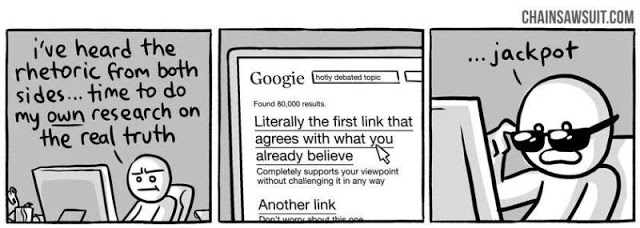

| Online: | |
| Visits: | |
| Stories: |

| Story Views | |
| Now: | |
| Last Hour: | |
| Last 24 Hours: | |
| Total: | |
Cognitive bias cheat sheet – Because thinking is hard
Ok, I confess. I'm biased. But I couldn't cope if I wasn't.
From Buster Benson's Great post on the human brain's often imperfect short cuts
http://chainsawsuit.com/comic/2014/09/16/on-research/
Four problems that biases help us address:
Problem 1: Too much information.
There is just too much information in the world, we have no choice but to filter almost all of it out. Our brain uses a few simple tricks to pick out the bits of information that are most likely going to be useful in some way.
The world is very confusing, and we end up only seeing a tiny sliver of it, but we need to make some sense of it in order to survive. Once the reduced stream of information comes in, we connect the dots, fill in the gaps with stuff we already think we know, and update our mental models of the world.
Problem 3: Need to act fast.
We’re constrained by time and information, and yet we can’t let that paralyze us. Without the ability to act fast in the face of uncertainty, we surely would have perished as a species long ago. With every piece of new information, we need to do our best to assess our ability to affect the situation, apply it to decisions, simulate the future to predict what might happen next, and otherwise act on our new insight.
Problem 4: What should we remember?
There’s too much information in the universe. We can only afford to keep around the bits that are most likely to prove useful in the future. We need to make constant bets and trade-offs around what we try to remember and what we forget. For example, we prefer generalizations over specifics because they take up less space. When there are lots of irreducible details, we pick out a few standout items to save and discard the rest. What we save here is what is most likely to inform our filters related to problem 1’s information overload, as well as inform what comes to mind during the processes mentioned in problem 2 around filling in incomplete information. It’s all self-reinforcing.
Read the whole thing @Cognitive bias cheat sheet – Better Humans:
Source: http://gmopundit.blogspot.com/2016/09/cognitive-bias-cheat-sheet-because.html



